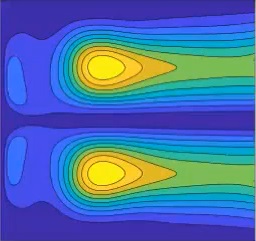Accelerating the solution of parameterized partial differential equations using machine learning tools
Video recording:
 Speaker: Ioannis Kalogeris (Computational Science and Engineering Laboratory, ETH Zurich, Switzerland)
Speaker: Ioannis Kalogeris (Computational Science and Engineering Laboratory, ETH Zurich, Switzerland)
Title: Accelerating the solution of parameterized partial differential equations using machine learning tools
Time: Wednesday, 2022.01.26, 10:00 a.m. (CET)
Place: fully virtual (contact Jakub Lengiewicz to register)
Format: 30 min. presentation + 30 min. discussion
Abstract: Simulation of complex physical systems described by nonlinear partial differential equations is central to engineering and physical sciences, with applications ranging from engineering design of vehicles or buildings to weather and climate. From a practical perspective, however, the computational cost of carrying out direct numerical simulation on detailed complex systems may be too large, reaching up to several days for a model evaluation in certain cases. In addition, many important applications such as uncertainty quantification, optimization or sensitivity analysis rely on performing a massive number of model simulations, which renders them computationally unapproachable. In this regard, the field of machine learning, with its recent advances, offers a promising new avenue for solving this type of problems and has already attracted major interest from the research community.
This presentation consists of two parts. In the first part a novel non-intrusive surrogate modeling scheme is introduced for predictive modeling of complex systems described by parametrized time-dependent PDEs. The proposed methodology utilizes a Convolutional Autoencoder in conjunction with a feed forward Neural Network to establish a mapping from the problem’s parametric space to its solution space, thus delivering a cheap-to-evaluate and highly accurate emulator of the complex model under investigation. The second part of the presentation addresses the issue of increasing the predictive capabilities of machine learning-based surrogate models by combining them with iterative solvers and, especially, the Algebraic Multigrid Method.
For this purpose, training data are collected by solving the high-fidelity model via finite elements for a reduced set of parameter values. Then, by applying the Convolutional Autoencoder, a low-dimensional vector representation of the high dimensional solution matrices is provided by the encoder, while the reconstruction map is obtained by the decoder. Using the latent vectors given by the encoder, a feed forward Neural Network is efficiently trained to map points from the parametric space to the compressed version of the respective solution matrices. This way, the proposed surrogate model is capable of predicting the entire time history response simultaneously with remarkable computational gains and very high accuracy. The elaborated methodology is demonstrated on the stochastic analysis of time-dependent partial differential equations solved with the Monte Carlo method.